Xiaoqi Ren
Gemini Embedding: Generalizable Embeddings from Gemini
Mar 10, 2025Abstract:In this report, we introduce Gemini Embedding, a state-of-the-art embedding model leveraging the power of Gemini, Google's most capable large language model. Capitalizing on Gemini's inherent multilingual and code understanding capabilities, Gemini Embedding produces highly generalizable embeddings for text spanning numerous languages and textual modalities. The representations generated by Gemini Embedding can be precomputed and applied to a variety of downstream tasks including classification, similarity, clustering, ranking, and retrieval. Evaluated on the Massive Multilingual Text Embedding Benchmark (MMTEB), which includes over one hundred tasks across 250+ languages, Gemini Embedding substantially outperforms prior state-of-the-art models, demonstrating considerable improvements in embedding quality. Achieving state-of-the-art performance across MMTEB's multilingual, English, and code benchmarks, our unified model demonstrates strong capabilities across a broad selection of tasks and surpasses specialized domain-specific models.
Noise-Aware Training of Layout-Aware Language Models
Mar 30, 2024Abstract:A visually rich document (VRD) utilizes visual features along with linguistic cues to disseminate information. Training a custom extractor that identifies named entities from a document requires a large number of instances of the target document type annotated at textual and visual modalities. This is an expensive bottleneck in enterprise scenarios, where we want to train custom extractors for thousands of different document types in a scalable way. Pre-training an extractor model on unlabeled instances of the target document type, followed by a fine-tuning step on human-labeled instances does not work in these scenarios, as it surpasses the maximum allowable training time allocated for the extractor. We address this scenario by proposing a Noise-Aware Training method or NAT in this paper. Instead of acquiring expensive human-labeled documents, NAT utilizes weakly labeled documents to train an extractor in a scalable way. To avoid degradation in the model's quality due to noisy, weakly labeled samples, NAT estimates the confidence of each training sample and incorporates it as uncertainty measure during training. We train multiple state-of-the-art extractor models using NAT. Experiments on a number of publicly available and in-house datasets show that NAT-trained models are not only robust in performance -- it outperforms a transfer-learning baseline by up to 6% in terms of macro-F1 score, but it is also more label-efficient -- it reduces the amount of human-effort required to obtain comparable performance by up to 73%.
Gecko: Versatile Text Embeddings Distilled from Large Language Models
Mar 29, 2024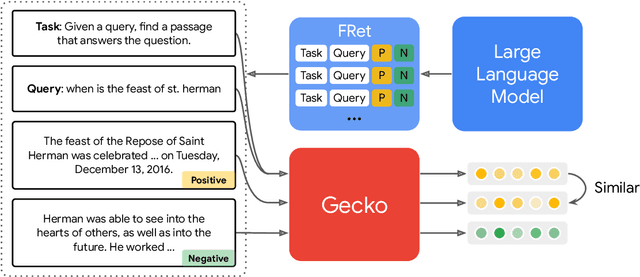


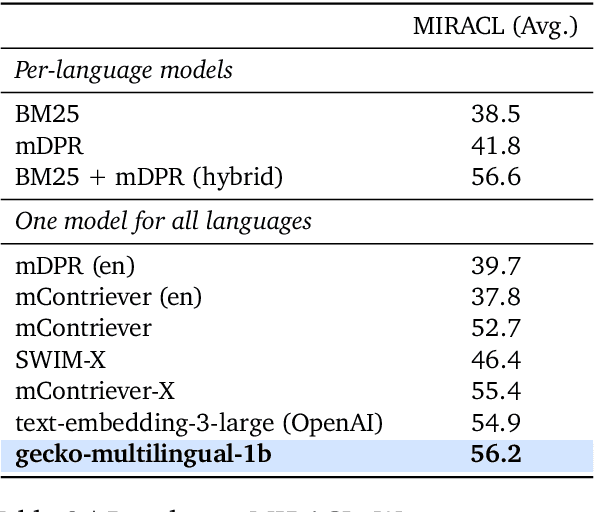
Abstract:We present Gecko, a compact and versatile text embedding model. Gecko achieves strong retrieval performance by leveraging a key idea: distilling knowledge from large language models (LLMs) into a retriever. Our two-step distillation process begins with generating diverse, synthetic paired data using an LLM. Next, we further refine the data quality by retrieving a set of candidate passages for each query, and relabeling the positive and hard negative passages using the same LLM. The effectiveness of our approach is demonstrated by the compactness of the Gecko. On the Massive Text Embedding Benchmark (MTEB), Gecko with 256 embedding dimensions outperforms all existing entries with 768 embedding size. Gecko with 768 embedding dimensions achieves an average score of 66.31, competing with 7x larger models and 5x higher dimensional embeddings.
DualPrompt: Complementary Prompting for Rehearsal-free Continual Learning
Apr 10, 2022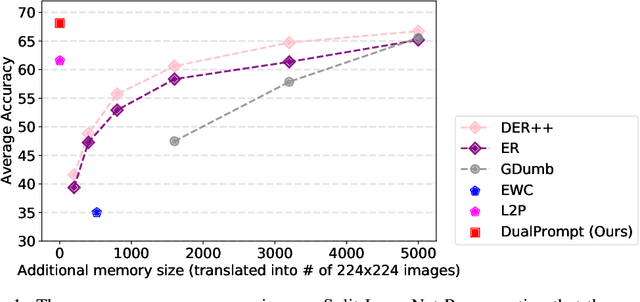
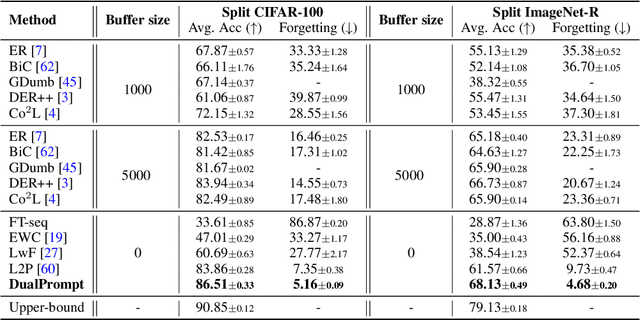

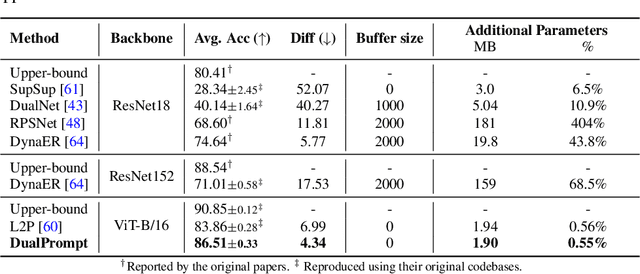
Abstract:Continual learning aims to enable a single model to learn a sequence of tasks without catastrophic forgetting. Top-performing methods usually require a rehearsal buffer to store past pristine examples for experience replay, which, however, limits their practical value due to privacy and memory constraints. In this work, we present a simple yet effective framework, DualPrompt, which learns a tiny set of parameters, called prompts, to properly instruct a pre-trained model to learn tasks arriving sequentially without buffering past examples. DualPrompt presents a novel approach to attach complementary prompts to the pre-trained backbone, and then formulates the objective as learning task-invariant and task-specific "instructions". With extensive experimental validation, DualPrompt consistently sets state-of-the-art performance under the challenging class-incremental setting. In particular, DualPrompt outperforms recent advanced continual learning methods with relatively large buffer sizes. We also introduce a more challenging benchmark, Split ImageNet-R, to help generalize rehearsal-free continual learning research. Source code is available at https://github.com/google-research/l2p.
Learning to Prompt for Continual Learning
Dec 16, 2021
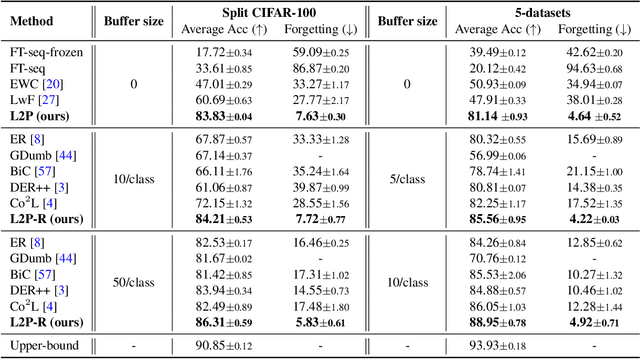
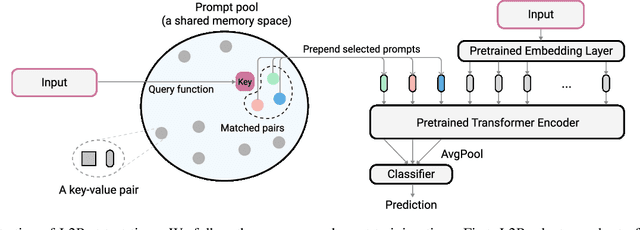
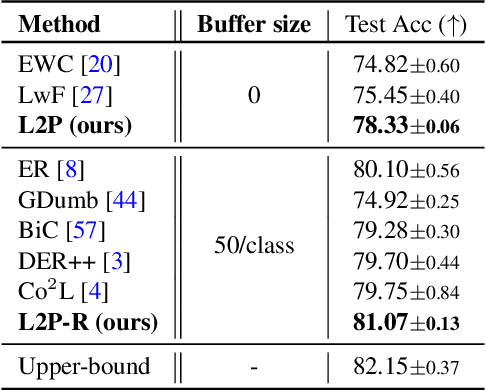
Abstract:The mainstream paradigm behind continual learning has been to adapt the model parameters to non-stationary data distributions, where catastrophic forgetting is the central challenge. Typical methods rely on a rehearsal buffer or known task identity at test time to retrieve learned knowledge and address forgetting, while this work presents a new paradigm for continual learning that aims to train a more succinct memory system without accessing task identity at test time. Our method learns to dynamically prompt (L2P) a pre-trained model to learn tasks sequentially under different task transitions. In our proposed framework, prompts are small learnable parameters, which are maintained in a memory space. The objective is to optimize prompts to instruct the model prediction and explicitly manage task-invariant and task-specific knowledge while maintaining model plasticity. We conduct comprehensive experiments under popular image classification benchmarks with different challenging continual learning settings, where L2P consistently outperforms prior state-of-the-art methods. Surprisingly, L2P achieves competitive results against rehearsal-based methods even without a rehearsal buffer and is directly applicable to challenging task-agnostic continual learning. Source code is available at https://github.com/google-research/l2p.
 Add to Chrome
Add to Chrome Add to Firefox
Add to Firefox Add to Edge
Add to Edge